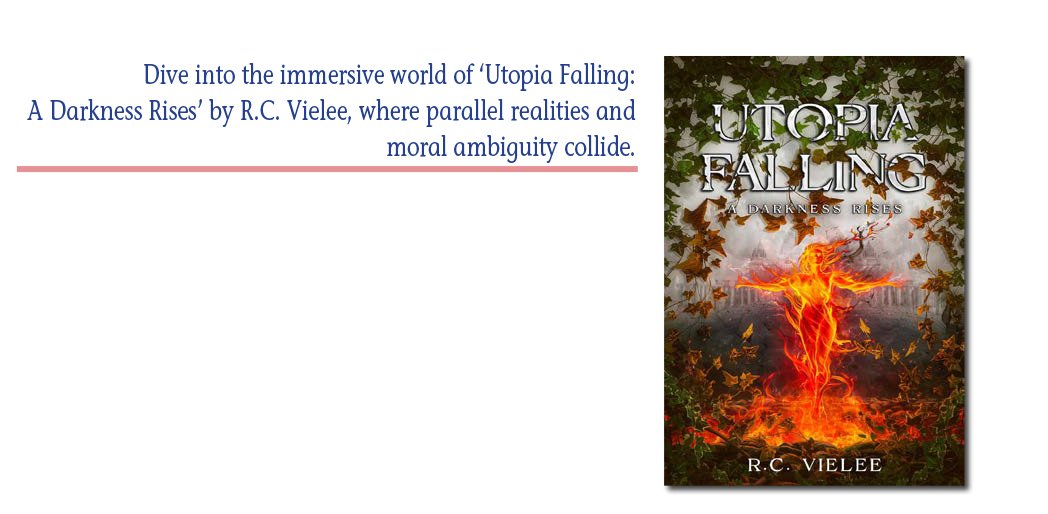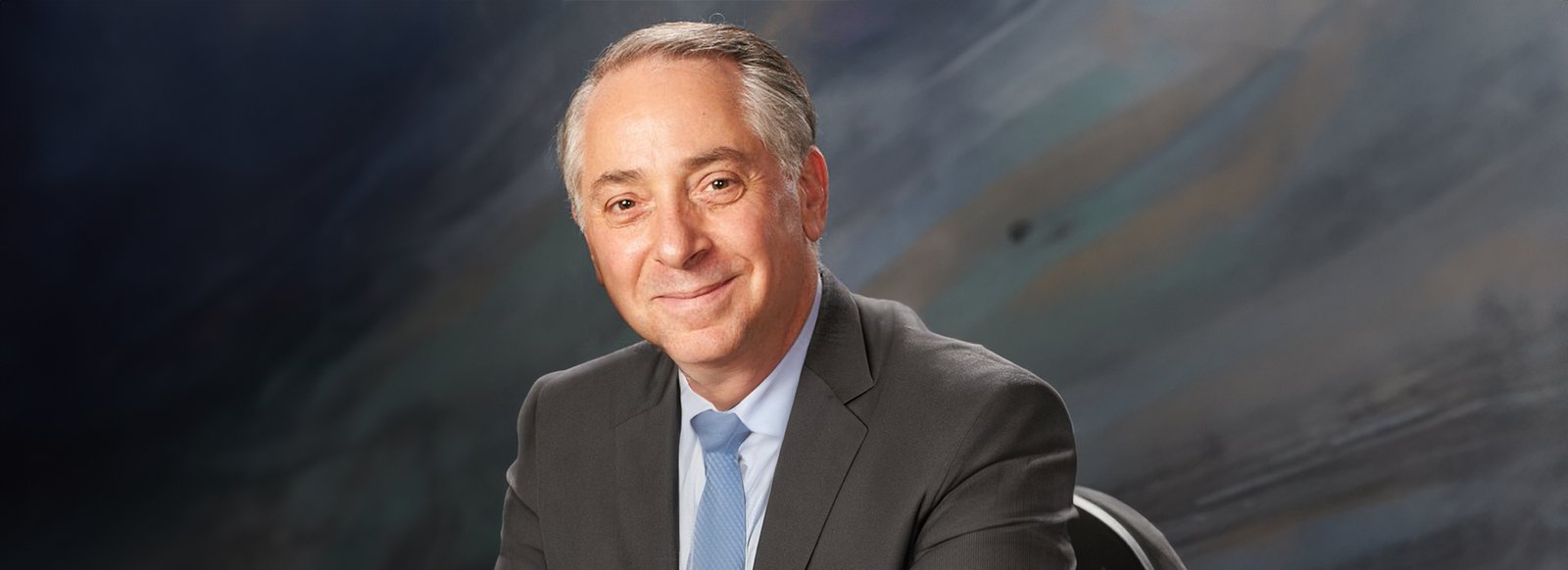Exploring Morality, Parallel Realities, and the Power of Imagination in Utopia Falling
Award-winning author R.C. Vielee discusses inspirations, moral complexities, and thematic depth in “Utopia Falling: A Darkness Rises” in an exclusive interview.
Delving into the depths of imagination and moral complexity, R.C. Vielee stands as a luminary in the realm of dark fantasy fiction. With a notable debut novel, “Utopia Falling: A Darkness Rises,” Vielee has captivated readers with a narrative that transcends mere storytelling, delving into the very essence of human nature and societal constructs.
Vielee’s journey from the quiet landscapes of northern New Jersey to the intricate tapestry of his literary creations is a testament to his multifaceted talent. Before wielding the pen as an award-winning author, Vielee honed his craft through the lens of a camera, capturing the beauty of the natural world as a landscape photographer. Yet, beneath the surface of serene landscapes lies a mind deeply intrigued by the mysteries of astrophysics, hinting at the vast expanse of his creative horizon.
In a recent interview with Reader’s House Magazine, Vielee opens the door to the worlds he has meticulously crafted, shedding light on the inspirations and complexities that permeate his work. At the heart of his narrative lies the dichotomy between Tartica and Evidar, two realms steeped in contrasting ideologies and moral quandaries. Reflecting on the tumultuous state of our own world, Vielee draws parallels between the struggles of his fictional realms and the divisive realities we face today.
Central to “Utopia Falling” is the theme of parallel realities, where individual actions reverberate across dimensions, shaping the fate of entire civilizations. Through characters like Reyne, Vielee navigates the intricate web of personal desires and societal obligations, challenging readers to confront the blurred lines between right and wrong.
Yet, it is in the moral ambiguity of characters like Neladith and the enigmatic Devil’s Blacksmith that Vielee truly shines. By crafting individuals grappling with their own desires and loyalties, he invites readers to introspect on the complexities of human nature, transcending the boundaries of hero and villain.
As readers journey through the pages of “Utopia Falling,” they are confronted with themes of redemption, power, and the resilience of the human spirit. Vielee’s narrative resonates with the raw emotions of grief, sorrow, and loss, yet amidst the darkness, a glimmer of hope emerges. Through the trials and tribulations of his characters, Vielee imparts a profound message of resilience and the enduring power of the human spirit to triumph over adversity.
In Vielee’s worlds, darkness and light intertwine, painting a vivid portrait of the human experience. As readers embark on this immersive journey, they are beckoned to confront their own beliefs, challenging preconceived notions and embracing the complexities that define us all.

What inspired you to create the world of Tartica and Evidar, and how did you go about developing their contrasting societies?
The state of our world today inspired me to create the realms of Tartica and Evidar. Tartica is seen as a near-utopia by its people, whereas Evidar is a brutal, violent place, forever in darkness.
Like the fantasy world created in Utopia Falling, in society today individuals at opposite ends of the political spectrum, or people holding different religious beliefs, and even those who disagree on climate science all share a common thread; the fervent amongst them vehemently believes the other side is not only wrong but are in the dark.
In Utopia Falling the story centers on Tartica’s fight for survival. Yet, the underlying threat to Tartica is Evidar’s quest for salvation at the expense of Tartica’s ruination. It begs the question; how does one interpret absolute morality if the worldview that one civilization holds, conflicts with the worldview of another? Are some issues of morality beyond question, while others are not? Can one overarching concept of morality be absolute? In writing Utopia Falling I didn’t take sides. I left it for the reader to interpret, or for the reader to ignore these larger issues and just lose themselves in a great fantasy story.
The theme of parallel realities and the consequences of individual actions seem to be central to “Utopia Falling: A Darkness Rises.” Could you elaborate on how this theme influenced the plot and character development?
Whether you live in the UK, the USA, or anywhere else, one’s perspective can be influenced by their socioeconomic conditions, political affiliations, race, religion, and so much more. People living in the same country, the same town, the same village, often hold different perceptions of it. It can seem like individuals living in society come from different worlds. In Utopia Falling, Earth exists in different dimensions composed of people originating from the same point of origin. The experience of living in one dimension or the other sets each character on a path to take actions they believe best serves their realm.
Reyne’s internal conflict between his personal desires and the larger fate of Tartica is compelling. How did you approach crafting his character arc, particularly in navigating his relationships and moral dilemmas?
In Utopia Falling the main character, Reyne, is an everyman. He wants to reap the promise of society engrained in the social contract: that if you play by the rules, you get the rewards. He quickly finds out that the little guy (or gal) is but a pawn in a game played by more powerful forces. The social contract serves the general population until it conflicts with the desires of the power brokers who play by different rules. Reyne is pressed to abandon his own self-interest–to marry the woman he loves, for the benefit of civilization’s ‘greater good’. His internal struggle is a metaphor for questioning the obligation of abiding by the demands of the greater good when the greater good breaks the promises inherent in its social contract.
The character Neladith serves as an antagonist but also seems to grapple with her own desires and loyalties. Can you discuss the complexities of creating characters who are morally ambiguous and the role they play in your narrative?
Each of us has issues with moral ambiguities when our self-interest comes into conflict with acceptable norms. It happens in everyday life more often than we care to admit. There’s a part of ourselves we hide from others. Sometimes it’s driven by desires that don’t fit in with what everyone else wants or what everyone else is doing. The hard wiring in our caveman brains tells us there is safety in the group and to subvert our self-centered wants in exchange for acceptance.
In Utopia Falling, I explore that aspect of the human condition through several characters, whether they are the good guys or the bad guys. Neladith is certainly a character you can love to hate. Her internal struggle tells us that self-interest is something even the bad guys have to resolve. Underneath it all, we’re all the same, wherever we come from.
The concept of the Devil’s Blacksmith and his manipulation of events adds an intriguing layer of political intrigue to the story. What inspired this character, and how did you develop the dynamics between him and other key figures like Jerithan?
In Utopia Falling, the Devil’s Blacksmith is the incarnation of the unseen forces that shape our world, whether that’s on a global basis or on the smaller scale of interpersonal relationships. To some the Devil’s Blacksmith might represent the deep state directing political actors to do their bidding. In the case of Jerithan, the Voice he hears in his thoughts prods him to take actions that ultimately serve the Devil’s Blacksmith’s objectives disguised in the offerings of something Jerithan desires.
Utopia Falling: A Darkness Rises blends elements of dark fantasy with themes of redemption and the consequences of power. How do you see these themes resonating with readers, and what messages or emotions do you hope they take away from the book?
Utopia Falling’s dark fantasy theme, verging on grimdark, is intended to hold a mirror up to the realities of life. Everyone faces difficult challenges. Sometimes we can rise above them. Others push us to our limits. And there are struggles we cannot overcome. We are defined by how we deal with tragedy. Some become bitter. Others become resentful. But the lucky can absorb the blow and become better for having successfully faced it head on. The joy we experience in life is so often influenced by how well each of us deals with the inevitable hardships each of us must face.
Utopia Falling will touch your emotions as you experience life through the eyes of the various characters. Grief, sorrow, and loss certainly play a role, but there is always hope. Like each of us in our own lives, the characters in Utopia Falling just have to find it.
Follow the Author:
- Web: https://www.rcvielee.com
- Instagram: https://www.instagram.com/rcvielee
- X: https://twitter.com/rcvielee
- Good Reads: https://www.amazon.com/Utopia-Falling-Darkness-Rises-Saga-ebook/dp/B0CBNKCGG2
- Amazon: https://www.amazon.com/stores/R.C.-Vielee/author/B0CBQKSGJT



